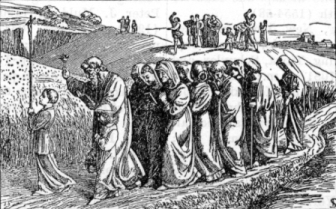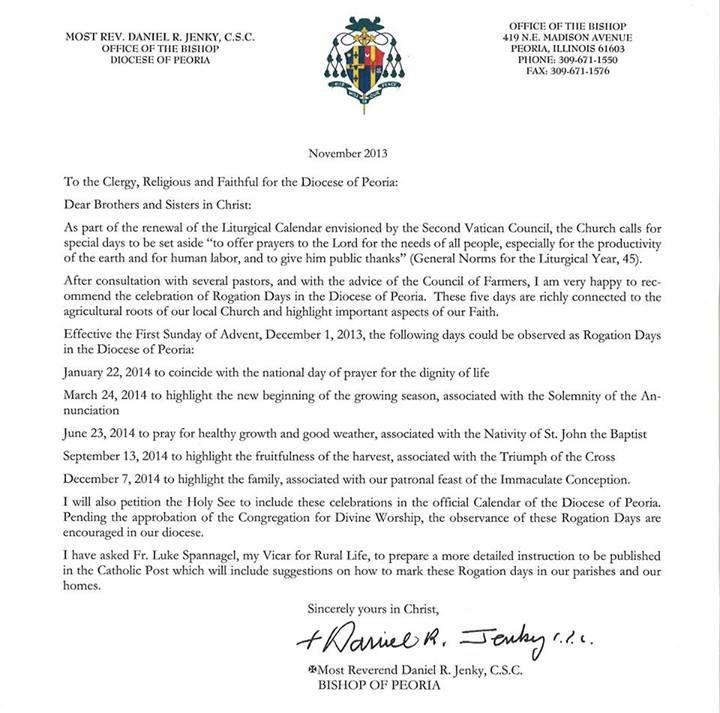Bishop Jenky (Diocese of Peoria) has just announced that he is petitioning the Congregation for Divine Worship to allow for Rogation Days to be added to the liturgical calendar for the Church of Peoria. (Letter of announcement available on his Facebook: link.) Could you please explain what Rogation Days are, and why they have disappeared?
Rogation Days were on the traditional Roman calendar for 25 April (Major Rogation Day) and the three days before Ascension THURSDAY (Minor).
“Rogation” comes from rogo “to ask”.
For the Major days, the Greater Litanies were recited and there could be a procession and prayers for blessings on crops. Remember, people didn’t divorce prayer from the things which were critical for survival.
The Minor days included the Lesser Litanies. Again, there are prayers and blessings for crops, given that it is spring (at least in the northern part of the globe). There would be the ceremony of the “beating of the bounds”. The procession would go around the boundaries of the property, singing litanies and prayers.
The traditional Roman calendar more thoroughly integrates the mysteries of the Lord’s life and turning of the Earth into the passing days of our lives.
Reason #746 for Summorum Pontificum, if you ask me.
 Why did Rogation Days disappear?
Why did Rogation Days disappear?
Like many other aspects of sacred time Rogation Days were dropped from the Roman calendar and, thereafter, fell into oblivion. Ember Days and Pre-Lent Sundays were brutally excised from our lives and they ought to be reclaimed. Another reason why Rogation Days fell away may be because we are now less rural and agrarian than ever before in human history. Also, perhaps such days tend to favor a Northern Hemisphere mentality. Dunno.
Across the board, we are less in touch with the sacred time. The electrification of our lives and ability to live in comfort without having chopped wood and gathered food all summer has pulled from our consciences a fundamental connection with God’s amazing cosmic set up.



































Couldn’t the bishop just celebrate Rogation Days in virtue of Summorum Pontificum by observing them according to the Extraordinary Form?
What an excellent idea. I hope this request is seriously considered. I have been having discussions with liberalized more traditional Catholics who see nothing wrong with parties and Christmas carol services in Catholic churches, especially in England. I find the lack of understanding of the liturgical year among Catholics appalling.
A second point would be that we all need to be cooperating with all the graces the Church can give us in these difficult times. We need to grow up and be adult Catholics, not kids always wanting cookies and candies and not the hard stuff of penance and prayer.
Thanks for sharing this, Fr. Z.
“Amazing cosmic setup…” Classic Ratzinger!
What exactly is the bishop requesting of the CDW? It looks like from the first half of his letter that he is implement Rogation Days for his diocese. OR his he recommending them and asking the CDW to allow him to mandate them? I would have thought that a bishop would have the authority to implement them anyway, as they have the authority to declare Sunday to be Thursday or the ability to delete Holy Days (e.g., Solemnity of Mary if it means you have to go to Mass two days in a row).
While our parish doesn’t celebrate Rogation days as they used to be, our Priest goes up in a parishioner’s airplane and blesses the fields in both parishes and the surrounding area.
I don’t believe the Ember and Rogation days were every really removed from the life of the Church, but rather removed from universal observance and left to local bishops (yes, I know that basically means abolished, but…). I am thinking Canon Law mentions that a bishop may utilize them as he sees fit, but I cannot recall exactly at the moment…
Father, what are the Greater and Lesser Litanies? I’ve always heard the Litany of the Saints said on all of the Rogation Days at my parish.
Rogation Days, certainly.
And Ember Days too, please – in the NO as well, I mean.
And the occasional sermon on the salutary need for fasting and abstinence as a holy penance would not go amiss.
We had our traditional Friday abstinence (from meat) restored in the Archdiocese of England and Wales in 2011 (after Pope Benedict ‘strongly suggested’ it to the Archbishop of Westminster).
And yet, apart from a small brochure that appeared for a couple of weeks at the back of every church, with barely any comment from the pulpit, since then I have noted no statements at all on the matter. Some have no idea what abstinence is, let alone that it is an obligation.
Any day now, I expect, someone will start to suggest that fasting and abstinence is inappropriate, as the present Pope is concerned about people who ‘do not have enough to eat’.
There are many parishes where the word ‘penance’ is taboo.
Frankly, I don’t quite understand the request. My own parish has always observed the (Minor) Rogation Days, without litanies, but with a 15 decade rosary instead. They are known as rogation days and participants are conscious to take part in a tradition.
Of course, the Mass is of the day, but isn’t there some votive Mass possible anyway? A weekday of Eastertide has not so high a rank I think… That, of course, could perhaps be the reason for the question. Still I find it worth noting: you need no permission to observe the Rogation Days as such. Mass is mass – in the old times, a priest could in some circumstance* say a quite joyful Mass of the day even over a dead body to be buried. Mass is Mass. If a priest says any canonically allowed Mass, followed by the ceremonies of Rogations, a Rogation Day has been celebrated.
[*To wit, if it was by the only priest available to say Mass in the Church on that day, the Church had an obligation to have conventual Masses, and if the day in question was a duplex feast. Or so. I paraphrase from the Catholic Encyclopedia.]
Curiously, the September Rogation/Ember Day medieval tradition has survived in the Anglican church to the present day.
Their ‘Harvest festival’ is traditionally held on the Sunday near or of the Harvest Moon (the full Moon that occurs closest to the autumn equinox – around Sept. 23).
It is still one of the more popular events in C of E country parishes.
Correction – I meant to write ‘September Ember Day medieval tradition.’
The fine historian Eamon Duffy, in his great book on the English Reformation ‘The Stripping of the Altars’ gives medieval accounts of the village Rogationtide procession, which was made partly to beat the parish bounds (=mark the boundaries) also to bless the fields, and bring good weather for the growing season. (His accounts are of the late 15th/early 16th centuries).
The processions ‘with handbells, banners and the parish cross, were designed to drive out of the community the evil spirits who created division between neighbours and sickness in man and beast.’ They were ‘centred around the litany of the saints…’ and considered an exercise of neighbourliness. They seem also to have been a time of almsgiving (which is consistent with the neighbourly theme.) ‘Those who absented themselves were seen as bad neighbours.’
These local parish processions around the fields (though stripped of their litanies) survived all the Reformation attempts to kill them off, and are still held in local Anglican parishes (mainly on Ascension Day) as ‘beating the bounds’, or ‘going a-ganging’ (ie. walking), singing hymns and psalms, and led by the rector.
Such a beautiful Catholic tradition – how bizarre that it survives here only among Anglicans.
If Rogation Days are deemed too focused at the Northern Hemisphere, the obvious solution would be to institute Antipodeal Rogation Days at suitable dates for harvests in the Southern Hemisphere. People in both hemispheres could celebrate the festivals opposite their own by praying (and perhaps fasting and giving alms) for the good of their brethren elsewhere, while the processions and blessings of the land could be celebrated at the time proper to their own harvest. And those who live in such a fortunate clime that they have harvests all the year round could celebrate both sets, as a fuller sign of the Rogation Days.
Four is a more churchy number than two, anyway.
Neat idea, and one very appropriate to a central Illinois diocese with some of the richest farmland on earth. I’m guessing that praying for good weather also implies praying NOT to have bad weather such as droughts, floods or tornadoes (all of which have afflicted the area in recent years).
Pingback: Fr. Barron Comments on The Nativity of Luke's Gospel - BigPulpit.com
Pingback: CHRISTMAS EVE EDITION | iwannabeasaint
Here in Portland in Oregon, we have three Ember Days each year–one in Advent (it was Wednesday the 4th), one in Lent and one in September; re-established by Archbishop Vlazny in 2002. There are no specific liturgical forms imposed or ‘suggested’, that I know of (have never managed to get to Mass on these days– have either forgotten or been impeded by work etc).
“An Ember Day is a day for prayer and fasting. Ember days in the Archdiocese of Portland are encouraged, but not obligatory…. The prayer intention for the Advent Ember Day is ‘for the strengthening of marriage and family life.’ To fast means to eat only one full meal on this day. The other two meals should be less than the normal amount unless they are already at the minimum for good health. Eating between meals is not permitted, but liquids are allowed.”
Perhaps Archbishop Sample will see his way, following on Mons Vlazny’s initiative, to return the Rogations to us, too, even in the novus ordo….